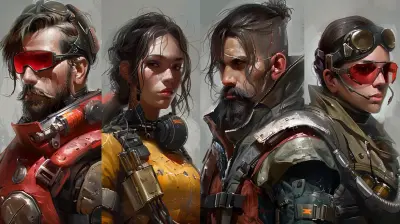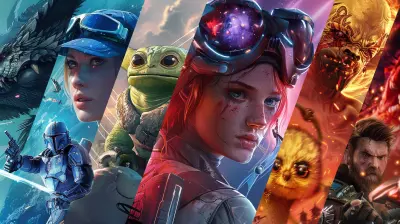How Gamers Express Identity Through Avatars and Usernames
2 October 2025
Gaming has come a long way from pixelated screens and beeping soundtracks. Today, it’s more than just a way to kill time—it’s a culture, a passion, and for many, a full-blown alternate reality. At the center of this universe? Gamers. And just like in the real world, gamers want one thing more than anything else: to be seen, heard, and recognized. That’s where avatars and usernames swoop in like superheroes.
But here's the real kicker—these aren't just random choices. They're personal. They're powerful. And they tell a story. So, how do gamers express their identity through avatars and usernames? Buckle up, because we’re diving deep into the digital soul of gaming culture.![]()
What’s In A Gamer’s Identity?
Before we zoom in on avatars and usernames, let’s take a step back and talk about identity. In the real world, identity comes from your name, personality, style, beliefs—you know, all the stuff that makes you, well… you.Now, imagine trying to squeeze all that into pixels and a few characters on a screen. Tough, right? But that’s exactly what gamers do every time they create an avatar or pick a username. It's their way of shouting, "Hey, this is who I am!" in the vast, chaotic multiverse of online gaming.![]()
Avatars: The Digital Mirror
More Than Just a Face
Don’t let those cartoony graphics or badass armored suits fool you. An avatar is way more than a visual placeholder—it's your digital mirror. Whether you’re a knight in fantasy lands or a mech pilot in a dystopian war zone, your avatar is a visual representation of who you want to be (or how you want to be seen).Some gamers go for hyper-realistic versions of themselves, almost like translating their real-world identity straight into the game. Others go the opposite route, choosing fantastical creations that reflect a side of them they can’t express IRL. Want to be a purple-skinned alien with glowing eyes? Go for it. Prefer a sleek, mysterious ninja vibe? Hey, that says something too.
Psychology Behind Avatar Choices
Yup, there’s actual psychology at play here. Studies show that we tend to choose avatars that reflect our ideal selves—or at least how we wish to be perceived.For example:
- Powerful Avatars – Often chosen by players who want to feel stronger or more confident than they do in real life.
- Funny or Cute Avatars – Reflect a playful, lighthearted, or mischievous personality.
- Non-human Avatars – Sometimes used to break away from real-world biases like gender, race, or age.
So yeah, picking an avatar isn’t always just about aesthetics. It’s personal. It’s emotional. It’s therapeutic even.![]()
Usernames: The Digital Signature
It’s Your Brand in the Gaming World
If avatars are your face, then usernames? They’re your brand. They stick. They’re the name people yell out in a heated match or the tag others remember when you dominated the leaderboard.A good username isn’t just about being witty or cool (though let’s be honest, that helps). It’s about identity. It's a digital fingerprint that's unique, meaningful, and often laced with little nuggets of personal history.
Where Do These Names Come From?
Usernames are like mini-time capsules. They often come from:- Nicknames – Shortened versions of real names or childhood aliases.
- Hobbies/Interests – You’ll spot loads of usernames that include favorite characters, sports, bands, or games.
- Random Generators – Some people use these for fun. Even then, they usually tweak it to make it their own.
- Personal Meanings – A date, a word in another language, or an inside joke only close friends would get.
Even if it sounds random to outsiders, there's usually some story behind it that only the gamer knows.![]()
The Role of Customization in Identity
One of the biggest draws in modern gaming is customization. It goes beyond just avatars and usernames. Think skins, voice packs, emotes, banners—you name it.Why We Crave Customization
Simple: it gives us control. In a game world where you might not control everything (looking at you, RNG), being able to design your look and name is empowering. It’s like decorating your room, but digital. And when others see your choices, it’s a sneak peek into your gaming soul.Plus, let’s be honest—there’s nothing more satisfying than someone checking out your fully geared-up character and thinking, “Whoa, that’s cool.” We all want that moment.
Cultural Identity and Representation
Let’s dig a little deeper here. For many gamers, avatars and usernames aren't just about self-expression—they’re about cultural representation.Think about it:
- Using a username in your native language.
- Choosing an avatar that reflects your race or ethnicity.
- Incorporating traditional symbols, colors, or styles into your in-game look.
These choices are powerful. They create visibility, foster diversity, and often help players feel seen in a space that can sometimes feel… well, kind of generic.
However, the lack of diverse customization options in some games has sparked important conversations. Gamers are pushing for more representation—more hairstyles, skin tones, body types, clothing styles. And slowly but surely, developers are listening.
The Evolution of Avatars and Usernames Over Time
Think about your very first gaming name. Cringe-worthy, right? Maybe you were “SniperKing98” or “xX_DarkLord_Xx.” We’ve all been there.As we grow, our digital identities evolve too. New interests, new vibes, maybe even a new gaming group—all of that influences how we present ourselves online.
Some people even rebrand entirely. New name, new look, fresh start. It’s like deleting your old Instagram and starting a new one with better filters and better vibes.
Influence of Online Communities
Here’s the thing—gamers don’t express identity in a vacuum. They're influenced by the communities they play in.Ever notice how certain gaming clans or guilds have styles, naming conventions, or shared aesthetics? That’s community culture at work. And when you’re part of that tribe, your avatar and username often reflect that shared identity.
It’s the gaming equivalent of wearing the school jersey or putting a bumper sticker on your car. You’re saying, “I belong here.”
Case Studies: Real Examples from Gamers
Let’s get real for a minute. Here are some quick examples that show the diversity in how gamers express themselves:- AmiraShadow – A female gamer who uses her middle name and her love for subtle, mysterious characters. Her avatar? A cloaked rogue with a glowing dagger.
- KitsuneRush – A user obsessed with Japanese folklore. Her avatar is a human-fox hybrid, and her username pays homage to the mythical kitsune.
- C0ffeeAdd1ct – A chill, late-night gamer who literally never logs on without a mug of dark roast. Simple, quirky, accurate.
- RaijinStorm77 – A username inspired by the Japanese god of thunder, chosen by a competitive fighting game fan who brings the storm every session.
These aren’t just names and pictures. They're identities—crafted carefully and proudly worn.
How Games Encourage Identity Expression
Not all games are equal when it comes to self-expression. Some titles go the extra mile.- MMORPGs like World of Warcraft or Final Fantasy XIV – Let’s you customize pretty much everything. You can spend hours just choosing your character’s nose shape or exact hair shade.
- Shooter games like Overwatch or Apex Legends – While customization isn’t as deep, cosmetics and skins still allow identity expression.
- Sandbox games like Minecraft or Roblox – Your look, your world, and your rules. The freedom is infinite.
Game developers are starting to understand: more customization = more player attachment = more time spent in-game. Win-win.
The Flip Side: Anonymity and Role-Playing
Interestingly, not everyone uses avatars and usernames to showcase their real selves. Sometimes, it’s the opposite—they use them to explore someone completely different.That’s the beauty of the digital world. Want to role-play as a villain? Go for it. Explore the opposite gender? Nobody’s stopping you. Try on a new personality like you’re trying on a new outfit. It’s fun, freeing, and sometimes even enlightening.
This kind of identity play isn’t fake—it’s another layer of how gamers express different parts of themselves.
Wrapping It Up
Avatars and usernames might seem simple on the surface, but they’re digital reflections of complex, living, breathing identities. Gamers use them to stand out, to belong, to explore, and to connect. Whether it’s through fierce armor, funky usernames, or culturally meaningful designs, one thing’s for sure—self-expression in gaming is here to stay.So next time you spot a creative gamer tag or a uniquely decked-out avatar, remember: there’s probably a cool story behind it.
And if you’re a gamer yourself? Take pride in your virtual flag. Fly it high. Because in the world of gaming, who you are is only limited by how far your imagination goes.
all images in this post were generated using AI tools
Category:
Gamer LifestyleAuthor:

Brianna Reyes
Discussion
rate this article
1 comments
Kenzie Love
This article insightfully explores the significant role avatars and usernames play in shaping gamer identity. It highlights how these elements foster personal expression and community connection, reflecting individual personalities and preferences in the gaming world.
October 2, 2025 at 4:32 PM

Brianna Reyes
Thank you for your insightful comment! I'm glad you found the article highlights the importance of avatars and usernames in gamer identity. They truly enhance personal expression and community ties.


